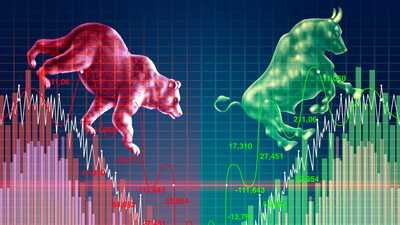| Home | About | Archives | RSS Feed |

@theMarket: Market Beat Down
 |
Rising inflation, weaker earnings expectations, or the rocketing U.S. dollar, it is just a question of which of these negatives are hurting the markets most. Investors are frightened, but not yet panicked. It is time to pay attention.
Both the Consumer Price Index (CPI) and the Producer Price Index (PPI) for June 2022 came in hotter than economists expected. They are backward-looking indicators, but markets fell on the reports, nonetheless. Rising energy prices was the biggest culprits in both reports hamstringing consumers and producers as prices soared. Since then, the price of oil has dropped, although natural gas prices have risen, so we will have to wait and see how much energy impacts this July's data.
However, with the higher year-over year CPI gain of 9.1 percent, coupled with the PPI's gain of 11.3 percent, the bond market is now betting on a one-in-two chance of a super-sized move in July's FOMC meeting of as much as a 100-basis point. Another 75 basis points is now also in play for the Fed's September meeting.
Corporate earnings for the second quarter kicked off this week. The money center banks announced poor earnings and even gloomier guidance. Investors have been expecting disappointments across the board, although some argued that poorer earnings were already reflected in the price of the stocks. Tell that to JP Morgan, the premier U.S. banking company, that saw its stock fall by more than 4 percent.
But the most troubling event is the continued climb in the U.S. dollar. I have advised readers over the last month to watch the level of the greenback. It is now trading at parity with the Euro. The last time this happened was in 2002, but it is not just the Euro. The dollar has been hitting 20-year highs against the currencies of its major trading partners as well.
As I have written before, a currency's exchange rate is a reflection on a country's economic prospects. In the case of Europe, higher energy prices, the Ukraine war, and record inflation have damaged the prospects for economic growth. As the European Unions' energy supplies dwindle, inflation has climbed by more than 8 percent and talk of rationing national gas supplies to industries is now on the table.
The European Central Bank (ECB) is between a rock and a hard place. If they raise interest rates to combat inflation, it could have a disastrous impact on the EU economy, which is already teetering on the edge, thanks to the war and energy embargos. But going slow on tightening monetary policy will only fuel higher inflation.
The U.S. may be facing its own bout of recession for some of the same reasons. The difference is that our Federal Reserve Bank has been more aggressive in tightening monetary policy than the ECB. And while energy prices are high in the U.S., they are still lower than in Europe. Natural gas prices, for example, are ninefold higher than in the U.S.
As far as currency markets today, it comes down to who has the cleanest shirt in the dirty laundry basket. The U.S. dollar wins that contest hands down. However, the downside for many American companies is that revenues and earnings generated overseas, and then repatriate are worth less. If instead, managements decide to keep their Euro earnings in Europe to cover costs there, the exchange rate becomes less of an issue. Another downside is that a stronger dollar makes American exports more expensive, which reduces U.S. economic output and widens the trade deficit.
Over the last week or so, Wall Street analysts have been scurrying to reduce their earnings estimates for more than 500 companies for this second quarter. It would not surprise me if equity strategists began to reduce their year-end estimates downward for the market averages. Talk of a more aggressive need to raise interest rates sooner than later to combat inflation, coupled with recession fears, is the motivating factor behind these moves.
The next FOMC meeting is drawing closer (July 26-27), which won't be good news for the markets, and in the meantime, we have an earnings season to contend with. At best, I expect to see a volatile market as earnings surprises, both positive and negative, send markets careening up and down through the rest of the month.
Bill Schmick is the founding partner of Onota Partners, Inc., in the Berkshires. His forecasts and opinions are purely his own and do not necessarily represent the views of Onota Partners Inc. (OPI). None of his commentary is or should be considered investment advice. Direct your inquiries to Bill at 1-413-347-2401 or email him at bill@schmicksretiredinvestor.com.

